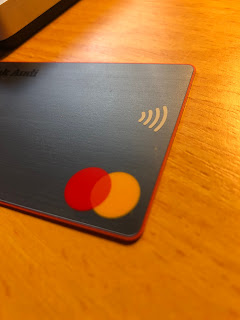Lebanon’s banks turning a new page with fresh cash accounts, cards and cheques
By Hani M Bathish
For the first time since the crisis began in Lebanon over three years ago, “fresh cash” account holders will be able to write cashable dollar and lira cheques starting June 1, and transfer both locally and abroad any amount of money from their fresh lira or fresh dollar accounts. This was made possible by Banque du Liban (BDL) Basic Circular 165 issued last month.
Some banks have been quick to respond, informing their customers that their new cards are ready and that they can collect them from their local branch. One particular bank’s new US dollar debit card has a distinct red band around it to distinguish it from cards linked to old dollar accounts that remain locked, which will have a blue band around them. Of course the red band comes with a fresh annual fee in cashable USD as well and the usual banking transaction fees.
 |
| Metal effect sleek card with red band denoting fresh cash account |
The circular effectively creates a separate clearing mechanism for fresh currency accounts within BDL’s National Payment System (NPS), a mechanism separate from that which handles and clears local transactions across locked accounts and places highly restrictive limits on cash withdrawals. Up to this point, most dollar cheques issued since the crisis began were sold by many desperate depositors on a parallel market for a fraction of their face value to individuals or businesses looking to use them to pay off old dollar loans to local banks with local dollar, otherwise known as “lollar”.
Nassib Ghobril Chief Economist at Byblos Bank, said the measure aims to activate the banking sector and make the economy less cash reliant. “Most interesting in this circular is that the mechanism is for both fresh dollar and fresh lira accounts, which allows business to deposit and withdraw any amount without limit, this should help gather all the cash hoarded in home and office safes, reducing risk of loss or theft,” Ghobril said.
He said this new mechanism shouldn’t impact old account holders who’s accounts remain locked pending much needed reforms and apportioning of financial losses by the State; instead, this circular merely formalizes the distinction and use of fresh funds as opposed to non-fresh funds by creating a mechanism that allows for greater flexibility in the transfer of such funds electronically or via cheque without limit or restriction.
“This circular is designed to help large companies that write cheques for large amounts or deposit large amounts,” Ghobril said. He added that when customers would come to banks to exchange lira banknotes for dollars at the Sayrafa rate or bring in large amounts in dollar banknotes to open letters of credit for importation, they would bring boxes of bank notes. This would no longer be necessary with the new mechanism.
“Most people keep banknotes at home making them susceptible to deterioration due to damp conditions or even at risk of theft,” Ghobril said, adding that the new mechanism makes it unnecessary to keep large amounts of cash in home safes out of concern that the funds may get stuck in banks and be subject to withdrawal restrictions.
“These measures taken by BDL do not lessen the importance of finding a solution to returning people’s locked deposits, unlike what some are claiming,” Ghobril said. He said that the State should answer three questions to reassure depositors: 1) what is the fate of their locked deposits, 2) how will these deposits be repaid, and 3) within what timeframe will these funds be returned. To date the State hasn’t answered these questions.
Risks to fresh funds high: NGO
In a recently tweeted video, managing director of local NGO Kulluna Irada, Diana Menhem, said that basic circular 165, which many see as beneficial in reducing the size of the cash economy, actually places people’s fresh funds in local banks at risk and makes money laundering easier.
She said that the dangers of this circular are greater than any potential benefits, claiming it makes money laundering easier by restricting monitoring of the source of cash funds to just local banks, especially since BDL did not put in place any mechanism for monitoring the source of these cash funds by local banks.
“This risks Lebanese banks being cut off from their correspondent banks and risks Lebanon being cut off from the global financial system, especially as international agencies tasked with monitoring suspected money laundering activities are watching Lebanon closely,” Menhem said in her short video.
She said that this mechanism places people’s fresh funds at risk, since the circular implies that fresh funds entering the local banking system have to enter BDL clearing accounts and potentially become part of the foreign currency reserves at the central bank. “There is nothing preventing the bank from spending these fresh funds as it used depositors’ money in the past,” Menhem said.
Ghobril dismissed these concerns and stressed that the circular will make transacting business for businesses easier and less dependent on cash.
The million dollar question however is will people trust the system that lost their money once before so dramatically and will they put their money once again in Lebanese banks?



Comments
Post a Comment